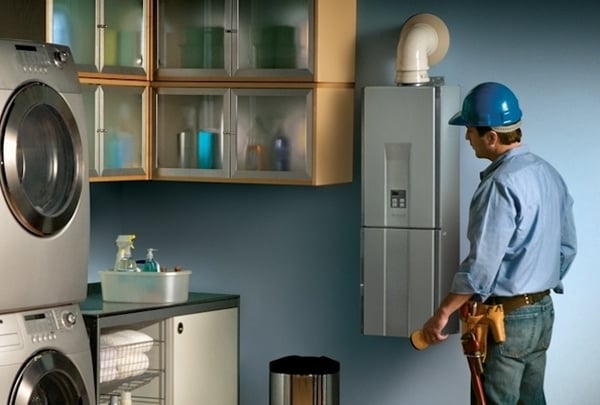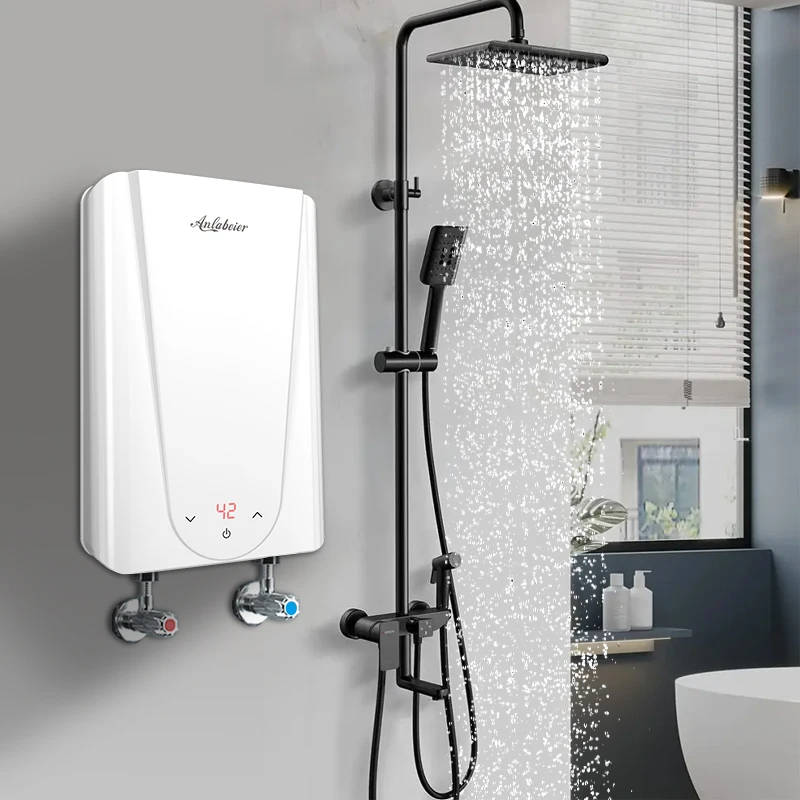What're your thoughts on 5 Benefits of Tankless Water Heaters?

In a globe where ease and effectiveness reign supreme, it's no surprise that home owners are frequently on the lookout for smarter ways to manage their home's energy usage and convenience. One innovation that has steadily obtained popularity is the tankless hot water heater. But just what makes these systems stand apart from the conventional tank-based models the majority of us grew up with? Let's dive in and check out the advantages of tankless water heaters, aiding you choose if it's time to make the button in your home.
Introduction
Picture this: you step into the shower after a long day, anticipating a relaxing waterfall of warm water, only to be greeted by icy droplets since the last individual utilized it all up. Audio familiar? Conventional water heaters keep a set amount of hot water, suggesting you go to the mercy of that container's supply. Tankless systems, on the other hand, warm water on demand. Say goodbye to going out mid-shower, no more wrestling with routines simply to make sure warm water is available.
Understanding Tankless Water Heaters
What Are Tankless Water Heaters?
Tankless water heaters, often called on-demand or instant water heaters, give warm water only as it's needed. Instead of saving gallons of pre-heated water, these units kick right into activity the moment you activate the faucet. Water passes through a heat exchanger, heating up in real-time, suggesting you obtain a continuous flow of hot water without the requirement for a big storage tank sitting idly by.
Exactly how Do They Differ from Conventional Systems?
Traditional heating systems hold a storage tank of warm water, utilizing energy to maintain that storage tank at a constant temperature. Tankless systems get rid of the standing supply, reducing lost power and the large footprint of a big cyndrical tube. Essentially, you're upgrading from a "stockpile" mindset to a "made-to-order" technique.
Common Kinds Of Tankless Systems
Tankless water heaters generally can be found in two selections: gas and electric. Gas models have a tendency to provide higher circulation prices, perfect for larger households, while electrical designs usually offer smaller homes and are generally simpler to install. Furthermore, some systems are designed for point-of-use (serving one component) while others can deal with the whole home's warm water requirements.
Key Advantages of Tankless Hot Water Heater
1. Countless Hot Water Supply
Ever needed to set up showers so everybody gets their reasonable share of warm water? With tankless, that becomes a thing of the past. As long as the heating system's flow capability isn't gone beyond, you can take back-to-back showers without turning into a popsicle.
2. Power Performance and Cost Savings
Say goodbye to heating up a giant storage tank's worth of water and maintaining it toasty all day. Tankless heating units reduce standby power losses, which can decrease energy bills. While the preliminary price could be higher, the long-lasting savings typically validate the financial investment.
3. Space-Saving Layout
If your home is short on storage, getting rid of the bulky tank liberates important space. Tankless units are portable and can commonly be mounted on walls, stashed in edges, or mounted in limited energy wardrobes without having all to oneself the entire space.
4. Longer Life expectancy
A well-maintained tankless water heater can outlive its tank-based relative. Standard containers might last 10-15 years, while tankless models can keep chugging along for 20 years or more, making them a solid investment over time.
5. Improved Water Top Quality
Saving water in a tank can occasionally result in sediment accumulation or a somewhat "off" taste. With tankless systems, fresh water is heated right away, decreasing the chances of debris accumulation and possibly providing cleaner-tasting water.
Factors to consider Before Switching
Though the benefits are engaging, it's wise to consider a few elements prior to fully dedicating.
Initial Financial Investment Prices
Tankless heaters generally include a higher in advance price tag. Between the device itself and potential installation modifications, the initial price may offer you sticker shock. But bear in mind to see it as a long-lasting financial investment.
Installation Requirements
Depending on your home's framework, you could require additional electrical capacity or gas line upgrades. Guarantee you recognize the installment requirements and talk to an expert to stay clear of surprises.
Examining Your Home's Water Use Patterns
If your house concurrently makes use of several fixtures with high warm water demand, see to it the device's circulation price satisfies your demands. Understanding your use patterns helps you choose the appropriate dimension and type of tankless heating system.
Maintenance and Care Tips
Tankless systems are reasonably low upkeep, but they aren't set-it-and-forget-it home appliances.
Routine Cleansing and Descaling
Hard water minerals can build up in the heat exchanger, affecting performance. Normal descaling (commonly recommended each year) keeps the device performing at peak performance.
Yearly Expert Inspections
A yearly checkup from a specialist ensures small issues are caught early. They'll evaluate the system's performance, seek leaks, and help keep optimal effectiveness.
Ensuring Appropriate Air Flow
For gas versions, correct ventilation is vital to securely get rid of exhaust gases. Ensure venting systems are tidy and properly mounted to avoid any type of possible safety and security dangers.
Comparing Different Brands and Models
Not all tankless water heaters are produced equivalent.
Investigating Trusted Manufacturers
Try to find trustworthy brands with a background of generating quality units. A trustworthy maker commonly offers far better customer support and longer guarantees.
Reading Testimonials and Customer Responses
Customer evaluations and feedback from next-door neighbors or buddies who have actually gone tankless can offer important insights. Often, real-life experiences can be a lot more informing than advertising and marketing pamphlets.
Setup: DIY or Expert?
While some property owners cherish taking on projects themselves, tankless setup could not be the very best time to break out the tool kit.
Benefits and drawbacks of DIY Installment
A DIY mount could save money, however it includes risks. Wrong setup can bring about ineffectiveness or safety issues. If you come in handy and have experience, it could be viable-- yet proceed with care.
When to Call an Expert Plumbing Professional
For the majority of, calling a professional ensures everything's done correctly. A specialist plumbing recognizes neighborhood codes, sizing demands, and airing vent criteria, reducing the danger of mishaps.
Making the most of Performance
You have actually bought a tankless unit-- currently maximize its effectiveness.
Optimal Temperature Level Setups
Most individuals set their devices in between 120-140 F. Readjusting the temperature level can improve convenience and cost savings. Experiment to find a wonderful area that does not waste power.
Pairing with Low-Flow Fixtures
Want to stretch your device's capacities? Think about setting up low-flow showerheads and taps. They lower water use, permitting your tankless system to supply a constant stream of hot water without stressing.
Ecological Impact
Tankless water heaters line up with greener living objectives.
Reduced Carbon Footprint
By using less power and just heating water as required, tankless systems can lower your home's carbon impact, minimizing your ecological impact.
Preserving Natural Resources
Much less energy consumption and much less wasted warm water equate into less natural deposits being used, an environmental win-win.
Who Profits Most from Tankless Heating systems?
The charm of tankless heaters is that they can match a selection of households.
Large Families vs. Solitary Owners
Big families may like the countless hot water supply, while solitary residents appreciate the energy savings from not heating a whole container for simply someone's morning shower.
Home Owners with Restricted Room
If your home is short on square video, shedding the bulky tank liberates area for various other fundamentals-- or possibly just extra elbow room.
Eco-Conscious Customers
Going tankless aligns with environmentally friendly values, ensuring you're not losing energy or sources.
Future Patterns in Tankless Hot Water Heater
The globe of home appliances is ever-evolving, and tankless water heaters are no exception.
Smart Home Assimilation
Envision changing your hot water heater's temperature by means of an app or receiving upkeep informs on your phone. As smart home tech developments, we'll see even more connectivity and convenience.
Advancements in Innovation
R&D is regularly enhancing warmth exchangers, making devices much more effective and sturdy. Future designs could be even quieter, much more small, and better matched for varying climates.
Final thought
Choosing a tankless water heater is more than just updating your home's hot water system; it's buying long-lasting convenience, power effectiveness, and a greener way of life. By considering your household's water usage, bearing in mind installation demands, and committing to routine upkeep, you can delight in a stable stream of hot water without the luggage of a bulky tank. As technology develops, you can eagerly anticipate also smarter, much more effective tankless options that not only make your life simpler yet also benefit the world.
Why You Should Consider a Tankless Water Heater for Your Home
Energy Efficiency and Cost Savings
Tankless water heaters, also known as on-demand water heaters, heat water only when needed. This means they don't waste energy keeping a tank of water hot constantly. This efficiency translates into substantial cost savings on your monthly energy bills.
Endless Hot Water Supply
One of the significant advantages of tankless water heaters is their ability to provide a continuous supply of hot water. Traditional tank water heaters have a limited capacity and can run out of hot water, especially during peak usage times. In contrast, tankless water heaters can provide an endless stream of hot water, making them ideal for larger families or homes with high water usage.
Space-Saving Design
Tankless water heaters are compact and take up significantly less space compared to traditional tank heaters. They can be installed on walls, under cabinets, or even outside, freeing up valuable space in your home. This makes tankless water heaters a great option for smaller homes or properties with limited space for a traditional water heater.
Longer Lifespan and Lower Maintenance
Tankless water heaters typically have a longer lifespan compared to traditional tank heaters. They can last up to 20 years or more with proper maintenance. Additionally, tankless systems are designed with replaceable parts, which can extend their lifespan further and reduce long-term maintenance costs.
Environmentally Friendly
Reducing energy consumption not only saves you money but also benefits the environment. Tankless water heaters contribute to a smaller carbon footprint by using less energy to heat water. Their energy efficiency and ability to minimize standby heat loss make them an eco-friendly choice for environmentally conscious homeowners.
Customized Temperature Control
Tankless water heaters offer precise temperature control, allowing you to set the desired temperature to meet your specific needs. This level of customization ensures you always have water at the perfect temperature for your comfort and usage requirements.
https://beantownservices.com/blog/consider-tankless-water-heater-for-your-home

I was made aware of that write-up on through a good friend on another domain. Make sure you take a moment to share this post if you liked it. Thanks for your time. Come back soon.
Estimate Free